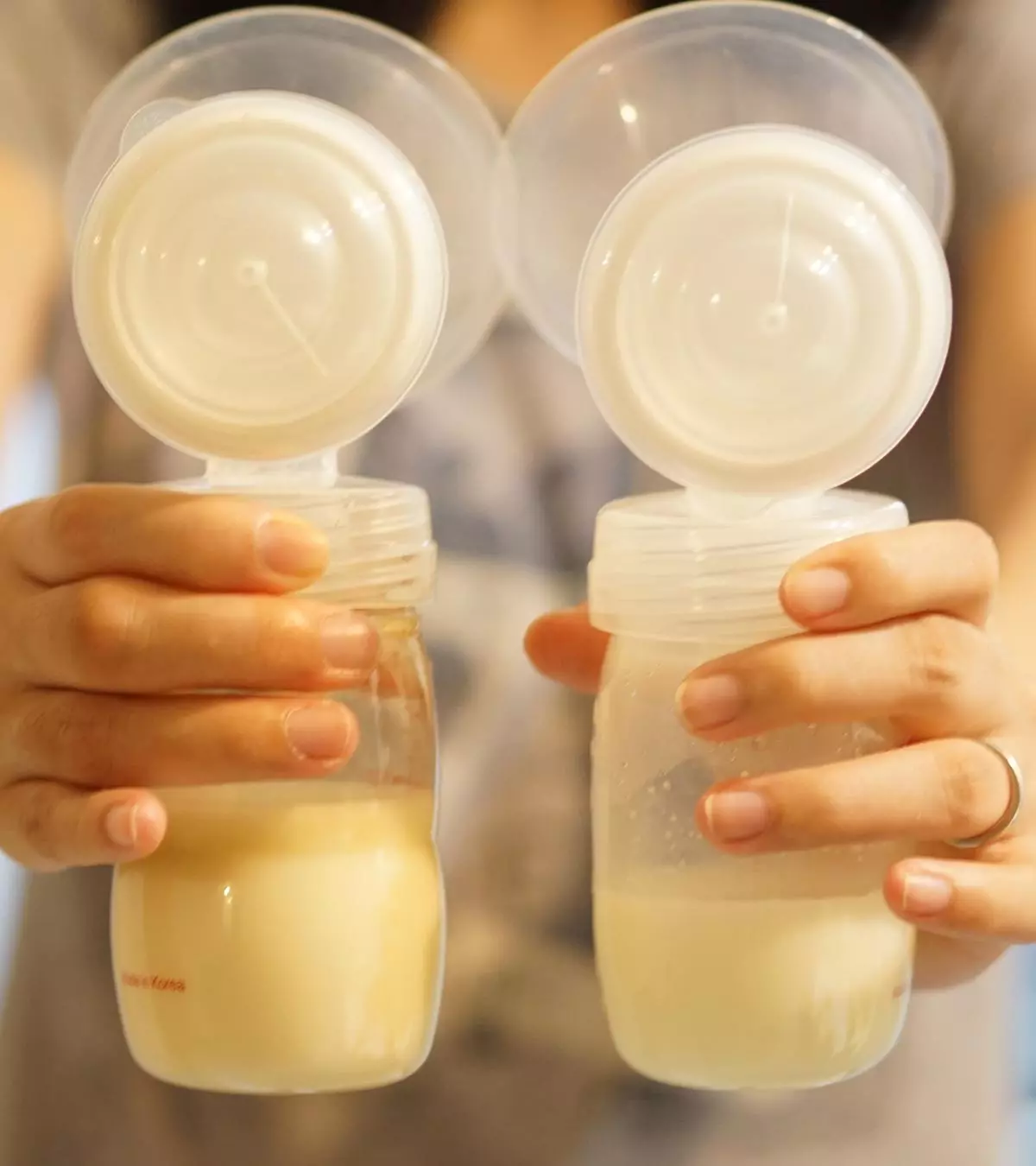
Image: ShutterStock

Breastfeeding moms, especially new moms, are extremely cautious about what they eat. If you are curious to know whether consuming oranges while breastfeeding is safe, read on.
Orange, a juicy citrus fruit, is one of the best sources of vitamin C. You may safely consume it during lactation since it can provide the energy and iron you need during this time. However, similar to other foods, too much of it may cause undesired reactions in your baby as they are not used to consuming high amounts of citric acid.
Read on to know more about the consumption of oranges while nursing in motherhood, including their benefits, side effects, and the treatment for these side effects.
Key Pointers
- Oranges are rich in vitamin C, which helps boost energy in nursing mothers.
- Sometimes, babies may develop reactions such as an upset stomach and start spitting after breastfeeding, after the mother consumes oranges.
- Furthermore, overconsumption of oranges while nursing may lead to diaper rash and fussiness in babies.
- Reducing the quantity of orange consumption and observing the baby for allergies may help prevent adverse effects.
- However, it is essential to speak to a healthcare provider in case of severe and prolonged sensitivities.
Benefits Of Eating Oranges While Breastfeeding

Image: Shutterstock
Can you drink orange juice while breastfeeding? Well, your body needs more Vitamin C while breastfeeding than during pregnancy. Orange is an excellent source of Vitamin C and it’s also great energy booster. It helps you absorb more iron from food. Hence, you might want to eat oranges or drink orange juice during breastfeeding.
 Quick fact
Quick factSide Effects Of Eating Oranges While Breastfeeding
For many moms, orange is one of the fruits to eat while breastfeeding. But, for you, it might not be the same case. In the first few months, as your baby’s intestinal tract is not fully mature and yet to develop, your baby might be sensitive to the high amount of citrus food in your diet.
- It may disturb your baby’s tummy, and they might get gassy, fussy or start spitting.
- Sometimes, they may develop diaper rash as their skin is sensitive and irritable to the acidic nature of citrus fruits.
 Did you know?
Did you know?If Your Baby Is Sensitive To Oranges?

Image: Shutterstock
If you feel your baby’s intestinal upset is because of the orange or orange juice you consume, you might want to try some preventive measures like:
Test if orange is the real culprit and reintroduce it and see if there are any side effects. If you notice your baby experiences fussiness and begins spitting within few hours of breastfeeding, it’s better to cut back on oranges as directed by a dietician.
Reduce the quantity of consumption and pay closer attention to your baby. If the pattern still continues, avoid oranges for a few days and see the difference.
If you can’t eat oranges, replace them with leafy vegetables or strawberries. These fruits will ensure you get enough Vitamin C. You may even consult your pediatrician if you think your baby is reacting negatively to oranges to avoid any nutritional imbalance in you and your baby.
Are Oranges The Only Cause Of Stomach Upset?
If your infant is gassy or fussy or is spitting, it is not necessary that your orange consumption is responsible. All babies have days when they get gassy or become fussy whether you breastfeed them or not. Sometimes, your baby’s digestive systems might be so sensitive that no matter what you feed your baby, they will experience stomach upset. Therefore, you need not think that the fussiness is because of your maternal diet and stop having oranges. Consult your doctor and find out what leads to these symptoms.
Treating Gas Problems In Babies

Image: Shutterstock
To alleviate any gas problems your little angel may face, try some simple tips we list here:
- Fold your baby’s legs up to the stomach in bicycle motion.
- Give your baby a warm bath.
Frequently Asked Questions
1. Can orange juice make breast milk acidic?
No. Orange juice or any other citrus fruit will not make your breast milk acidic because they do not change the pH of maternal plasma (1).
2. Which fruits should I avoid during breastfeeding?
Many women want to know about fruits to avoid while breastfeeding because they believe these may have adverse effects on their babies. However, it is important to understand that most beliefs do not have a scientific basis (2). Studies show no need to avoid any fruit during breastfeeding unless it adversely affects your baby (1).
3. Which fruit is good for breast milk?
There are no fruits that should be eaten specifically for breast milk. You should eat a well-balanced diet to stay energetic and get sufficient nutrition. The US Department of Agriculture suggests including fruits and vegetables, whole grains, milk, yogurt, cheese, and proteins in your daily diet (3). Staying hydrated, eating a nutritious diet, and paying attention to your baby’s needs are key to a positive breastfeeding experience.
Oranges are a good source of vitamin C that provide lactating women with energy and enhance iron absorption. However, consuming oranges while breastfeeding may irritate your baby’s digestive system and make them gassy and fussy. If you notice that your consumption of oranges is having a side effect on your baby, you may cut down on their quantity. If the problem persists, you may have to avoid oranges while breastfeeding. Replace oranges with other vitamin C sources, such as strawberries. However, remember that children may become gassy due to reasons not connected to the intake of oranges. Keep an eye on your baby’s health and see what may cause a stomach upset. Consult a doctor if you are not sure about your baby’s digestive issues.
Infographic: Oranges While Breastfeeding – Benefits & Side Effects
Oranges are nutritious fruits to your diet while breastfeeding. They are a good source of vitamin C and fiber. However, like all foods, oranges can also have some side effects. Thus, it is essential to be aware of adverse effects along with the benefits. This infographic can help you learn its benefits and side effects during breastfeeding. Illustration: Momjunction Design Team
Illustration: Is It Safe To Consider Eating Oranges While Breastfeeding?

Image: Dall·E/MomJunction Design Team
Discover the amazing health benefits of citrus fruits! Learn with this video how fruits like oranges can help improve your overall health and well-being.
References
- Goun Jeong et al.; (2017); Maternal food restrictions during breastfeeding.
https://www.ncbi.nlm.nih.gov/pmc/articles/PMC5383635/ - Karolina Karcz et al.; (2025); Foods to Avoid While Breastfeeding? Experiences and Opinions of Polish Mothers and Healthcare Providers.
https://www.ncbi.nlm.nih.gov/pmc/articles/PMC7352950/ - Are There Breastfeeding Superfoods That Help Increase Milk Production?
https://health.clevelandclinic.org/foods-to-increase-milk-supply - Are Oranges Good for You — or the Planet?
https://foodrevolution.org/blog/are-oranges-good-for-you/ - 5 best and worst foods for breast milk supply.
https://www.lebonheur.org/blogs/practical-parenting/5-best-and-worst-foods-for-breast-milk-supply
Community Experiences
Join the conversation and become a part of our nurturing community! Share your stories, experiences, and insights to connect with fellow parents.
Read full bio of Joanne Aubrey
Read full bio of Jessica Albert
Read full bio of Rohit Garoo
Read full bio of Shinta Liz Sunny
















